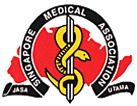
THESMANEWS
Present Issue
Past Issues
Journals
Present Issue
Past
Issues
Letters to the Editor

SO WE SHOULD NOT ADVERTISE
The wish to advertise one’s services is great, especially if one has invested a lot and wants to recover the capital ploughed into the enterprise. This is the beginning of a slippery slope. The person or organisation about to embark on the slope says he will remain above board and be ethical. But unfortunately, a slippery slope is such that once on it, the laws of physics dictate that whatever is on it must slide down, and at an ever increasing pace. This sums up why the medical profession’s code of medical ethics forbids advertising.
It is important that those in and out of the medical profession are reconciled to the notion that the respect the medical profession gets, hangs on the public’s trust that doctors will do good, and will do no harm. The doctor has a contract that he will serve the community. This is recited by doctors upon the completion of their housemanship, at the ritual of the Singapore Physician’s Pledge. That doctors will serve the community by doing good and doing no harm is also stipulated in the Hippocratic Oath and the Declaration of Geneva.
Relaxation of the principles to allow the medical profession to advertise liberally is likely to result in the persons involved to fall into situations where there may be too much vested interest for one to be objective and to be able to say honestly that the patient’s interest has come first. The patient’s interest may then drift into a second place, with survival of the enterprise taking the first place.
It is incumbent that the leaders of the medical profession, both in and out of Parliament, convince entrepreneurs of the reason why they have hung on to the conservative view on advertising. One cannot fault the layman for wanting to allow advertising, particularly, if they invested heavily. They may fail to see the difference between the responsibility to the community that they, and the doctors, have. It is up to the medical profession to show them the way and not the other way round.
It is important also to note that whilst we may want to liberalise medical advertising to the detriment of the community that we serve, other countries around the globe may not share our view. The recent unhappiness that the Malaysian Medical Association had with some Singaporean doctors on the promotion of the gamma knife is a case in point. When we are the recipients of the consequences of foreign-origin advertising, we too begin to realise the importance of forbidding advertising in health care. A case in point is reported in this issue of the newsletter.
Liberalising medical advertising is to allow people to get on a slippery slope. However logical and balanced one can be as we stand poised at the top of the slope, the same cannot hold true when we are tumbling down it. It is therefore heartening to note that the provisions on advertising in the Private Hospitals and Medical Clinics Act have been conservative.
The best medicine about medical advertising is not to get on that slippery
slope in the first place. Perhaps, just as well too. Doctors should gain
their reputation from the patients’ mouth and no other way as good wine
needs no bush. We should therefore concentrate on doing the best for our
patients. They will take note of that.